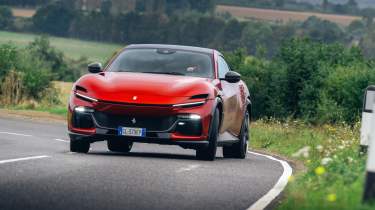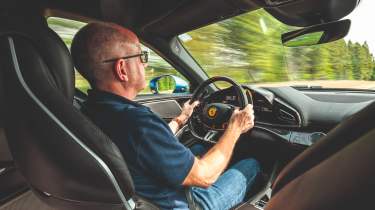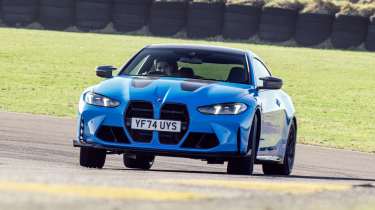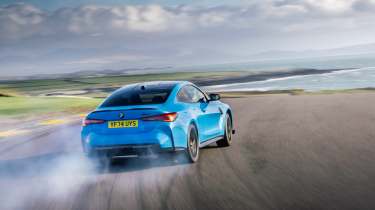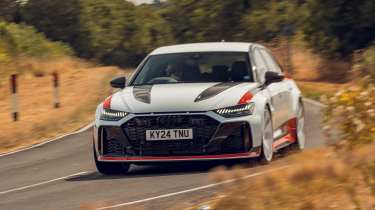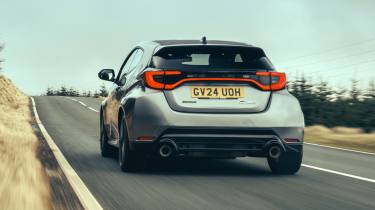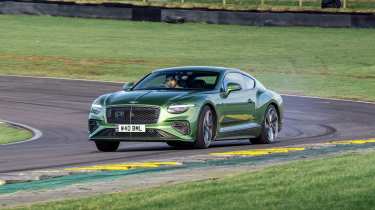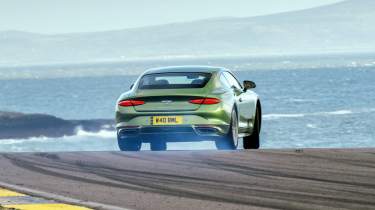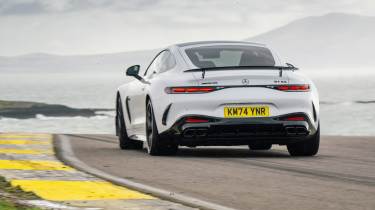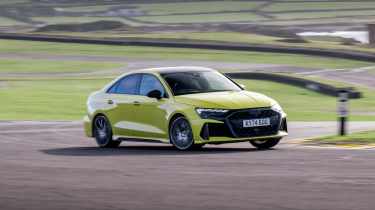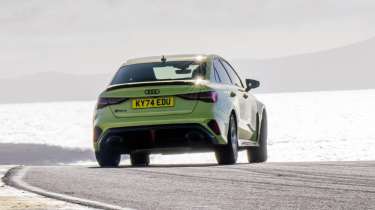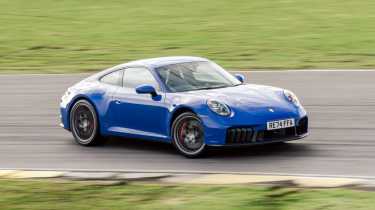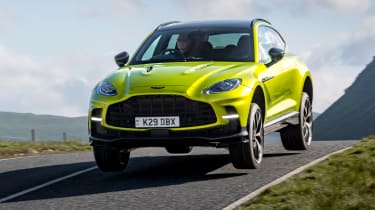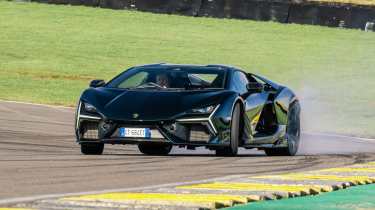Best 4x4 cars 2025 – our pick of today’s top all-wheel-drive performance cars
All-wheel-drive isn’t just for off-roading, the best 4x4 performance cars deliver huge reserves of capability on the Tarmac
Ever since Audi changed the World Rally Championship with its all-wheel drive Quattro, the performance potential from driving all four wheels has been abundantly clear. Plenty of other brands are firmly on the 4x4 bandwagon as well, Porsche applied an all-wheel-drive system to its 911 sports car and the 959 supercar, Nissan brought out the hammer-blow that was the Skyline GT-R and Mitsubishi, Subaru, Lancia, Toyota and Ford were transferring four driven wheels from the rally stage to their performance road cars. Over four decades on from the Quattro’s debut, the performance car market is shot through with machines that send power to all corners in all sorts of different ways and the best 4x4 cars still take some beating.
The role of all-wheel drive as a traction aid hasn’t changed in general. That being said, what was once a way of making performance cars more usable in a wider variety of road surface conditions, is now basically essential to harness the power (and holster the weight) of the latest high-performance cars. Some of today’s hot hatchbacks like the Audi RS3, have close to 400bhp. Super SUVs like the Range Rover Sport SV have over 600bhp, while machines in the upper echelons of the production supercar space, like the Lamborghini Revuelto, have over 1000bhp.
All-wheel drive makes a lot of sense then, especially in the variety of ways it can now be manifested. Some hybrids don’t even connect the petrol engine to the front wheels, while clever computer systems and differential hardware conspire to make the latest performance cars more agile and pliable than ever before. As we’ve discovered in extensive testing of all the latest all-wheel-drive performance models, on road and track, 4x4 is no longer just for getting muddy, or making Porsche 911s idiot-proof. It’s a way of further increasing the remarkable breadth of abilities of the modern performance car. In no particular order these are our favourites.
2025's best all-wheel-drive cars – specs
| Car | Engine | Power | Torque | Weight | 0-62mph | Top speed | Price | Star rating |
|---|---|---|---|---|---|---|---|---|
| Ferrari Purosangue | V12, 6496cc | 715bhp | 528lb ft | 2033kg (dry) | 3.3sec | 193mph | £313k | 4.5 |
| BMW M4 CS | I6-cyl, 2993cc, twin-turbo | 542bhp | 479lb ft | 1760kg | 3.4sec | 188mph | £122k | 4.5 |
| Audi RS6 GT | V8, 3996cc, twin-turbo | 621bhp | 627lb ft | 2075kg | 3.3sec | 190mph | £177k | 5 |
| Defender Octa | V8, 4395cc, twin-turbo | 626bhp | 553lb-ft | 2510kg | 4sec | 155mpg | £145k | 4.5 |
| Toyota GR Yaris | I3, 1618cc, turbocharged | 276bhp | 288lb ft | 1280kg | 5.2sec | 143mph | £46k | 5 |
| Bentley Continental GT Speed | V8, 3996cc, twin-turbo, 140kW e-motor | 771bhp | 738lb ft | 2459kg | 3.2sec | 208mph | £236k | 4.5 |
| Mercedes-AMG GT 63 | V8, 3982cc, twin-turbo | 577bhp | 590lb ft | 1895kg | 3.2sec | 196mph | £170k | 4.5 |
| BMW M5 | V8, 4395cc, twin-turbo, 145kW e-motor | 717bhp | 737lb ft | 2435kg | 3.5sec | 190mph | £111k | 4 |
| Range Rover Sport SV | V8, 4395cc, twin-turbo | 626bhp | 553lb-ft | 2485kg | 3.9sec | 180mph | £177k | 4.5 |
| Audi RS3 | In-line 5-cyl, 2480cc, turbocharged | 394bhp | 369lb ft | 1565kg | 3.8sec | 155mph | £61k | 4 |
| Porsche 911 Carrera 4 GTS | Flat-six, 3591cc, turbocharged, 41kW e-motor | 534bhp | 450lb ft | 1645kg | 3sec | 194mph | £144k | 4 |
| Aston Martin DBX707 | V8, 3982cc, twin-turbo | 697bhp | 663lb ft | 2245kg | 3.3sec | 193mph | £210k | 4 |
| Lamborghini Revuelto | V12, 6499cc, three e-motors | 1001bhp | 738lb ft | 1772kg | 2.5sec | 217mph | £454k | 5 |
Ferrari Purosangue
-
Prices from £313k
Pros – Superb Powertrain, impressive dynamic ability, that engine
Cons – Complex user interface, heavy
Sacrilege or a stroke of genius? Many couldn’t quite make up their minds whether Ferrari had built its first SUV or whether to toe Ferrari’s line that this was its first ever authentic Ferrari four-door, four seat sports car. Once it’s been driven though it’s clear that this is a superb car with a glorious powertrain and levels of impressive dynamic ability.
At its heart lies a 6.5-litre V12 that develops 715bhp and 528lb ft of torque. It revs to a heady 8250rpm and despite its two-ton plus weight it’ll hurtle from 0-62mph in 3.3sec. It sounds sensational too, subdued when on a fast cruise but inspirational when you fully open the V12’s taps. And that duality tends to sum up the Purosangue which can be the refined and supple long distance GT one minute and an agile and enthralling back-road blaster the next.
It's a hugely complex machine – its Multimatic dampers are so fancy that they require their own cooling system – but it feels a very natural car to drive quickly. It’s not perfect with haptic UI that’s best described as a bit clonky and a lack of the luggage space expected in this type of car, but unleash the naturally aspirated V12 and revel in its tactile handling and you can forgive just about anything.
‘The way it controls its mass, deploys its performance and dissects a challenging road is genuinely befuddling, thanks to pin-sharp steering and dazzling rate of turn paired with next-level pliancy. Topped with a towering V12 powertrain from the gods, it could only be a Ferrari, yet it feels like no other Ferrari I have ever driven.’ – Richard Meaden, evo co-founder and editor-at-large, who tested the Purosangue against the Aston Martin DBX707.
Alternatives: Like-for-like rivals to the Ferrari Purosangue number zero, on account of it being a V12-engined SUV. But Aston Martin’s DBX707 and Lamborghini’s Urus SE offer badges of comparable stature, with a performance/practicality pairing to match.
BMW M4 CS
-
Prices from £122,685
Pros – Devastatingly quick with a chassis to match
Cons – Needs pricey options to get the best from it
The M4 CS has all the right ingredients to be judged as an all-time great. Twin-turbocharged straight-six developing 542bhp and 479lb ft, a slick shifting eight-speed ‘box and a neutral and grippy rear-biased all-wheel-drive chassis. And on the right road in the right conditions it’s absolutely ballistic.
The CS is, of course, a blend of the best bits from the M4 Competition and the M4 CSL, using the latter’s uprated straight-six and the former’s all-wheel-drive drivetrain and it’s all the better for having four driven wheels, the CSL just being a little bit too spiky with rear-wheel drive in all but the most perfect conditions. The M4 CS isn’t immune from needing the right conditions either as its Cup 2 R tyres need to get up to temperature before it delivers its best.
But it certainly delivers in those circumstances with a front end that resists understeer and feels very grippy and the M-tuned xDrive system really allowing you to extract the best from the car in most situations. It needs the right road and conditions to be in its element though and despite being a good all-rounder, it was joint second last in our 2024 eCoty test.
‘It’s a resolutely rear-biased car but if you do start to get past the point of no return, the front wheels are there like rotund wingmen to help drag you out. The current M3 and M4 in all their forms (and the M5, for that matter) are among the first to show just how versatile modern-era all-wheel drive can be – and that it doesn’t have to mean mixing the chaff with the wheat.’ – James Taylor, evo deputy editor, who drove it on our 2024 evo Car of the Year test.
Alternatives: Rivals to the BMW M4 CS are few but if you’re not in need of the BMW’s practicality, the new Porsche 911 GTS is a more focused but less hardcore option.
Audi RS6 GT
-
Prices from £177,115
Pros – Rapid, capable and hugely enjoyable
Cons – You won’t slip by unnoticed, it’s a bit pricey
Let’s not beat around the bush; the Audi RS6 Performance is a really good car, but the RS6 GT is an astonishing one. It’s a last hurrah for the iconic petrol-powered RS6 and while its powertrain might be the same twin-turbocharged V8 unit as used in the standard RS6 its 621bhp and 627lb ft are more than enough to give it nigh-on supercar performance levels. It’ll hit 62mph in 3.3sec, 124mph in 10.4 on its way to a top speed of 190mph.
New for the GT is a coilover suspension setup to replace the standard adaptive air suspension while the legendary quattro all-wheel drive has added some new weapons to its arsenal. It has an updated centre diff and a GT-specific tune of the rear diff with the former dividing torque 40:60 front to rear, and if slip is detected then up to 70 per cent can be sent to the front axle, or 85 per cent to the rear.
The standard RS6 isn’t a blunt tool but the GT ups the ante with more rotational energy and greater throttle adjustability and the whole package can be placed with greater precision and accuracy. It was a contender on our 2024 Car of the Year test and while it wowed the judges with its ability it was pipped at the post and missed out on a podium position. So, no eCoty win, but as one tester put it ‘There’s more than a whiff of M5 CS about the RS6 GT’ which is high praise indeed.
‘The recalibrated Sport Differential is clever, not least because you don’t sense it working. What you do notice is that the GT has more rotational energy and greater throttle adjustability. Tighter corners can be attacked with more enthusiasm, and fast corners can be taken with greater precision, the smallest variation in throttle opening subtly tightening or widening your line.’ – Richard Meaden, evo co-founder and editor-at-large, who tested the RS6 GT on the road in the UK and on our evo Car of the Year 2024 test.
Alternatives: Mercedes-AMG is out of the full-fat fast estate arena but now BMW M has waded in, with the 700bhp+ M5 Touring the closest rival the Audi RS6 GT can look to.
Land Rover Defender Octa
-
Prices from £145,300
Pros – Dynamic qualities to rival a sports car
Cons – Where can you explore them fully?
Land Rover has always been synonymous with the mud-plugging end of the all-wheel drive market and while its current product portfolio has moved upmarket in recent years they’re still hugely capable when it comes to the rough stuff. And that applies doubly to the Defender Octa, a Land Rover turned up to 11, both on- and off-road.
Under its bonnet is a BMW M-sourced 626bhp V8 that’s good for a 0-62mph time of 3.8sec when in launch mode. It’s wider to accommodate longer wishbones and it’s taller too for even better ground clearance off-road. Perhaps its most fascinating tech though is its 6D suspension that includes hydraulically linked continuously variable semi-active dampers and while it’s not exactly the most communicative set up in the sense of a traditional sports car the Octa feels tighter, more responsive and keen to engage on-road than all but the very best performance SUVs.
Perhaps what’s even more impressive is that this new-found on-road ability applies when you turn off the blacktop, too. No matter the surface the Octa tackles everything in its path as if it were on a Dakar special stage but all the while its occupants are treated to a level of ride-quality and composure that just wouldn’t be possible in a standard Defender. The perfect go anywhere car?
‘The Defender Octa is a remarkable achievement. It is so much more than the G63 from the Black Country ‘Defender SVR’ we all had in our mind’s eye, back when Land Rover’s reborn icon broke cover in 2019.’ – Ethan Jupp, evo web editor, who tested the Defender Octa on- and off-road in the UK.
Alternatives: The super SUV set is expansive but none face the Defender Octa head-on, as an honest to goodness trophy truck for the road. Want similar off-road capability? Only a Ford Ranger (or F150) Raptor comes close, albeit without the Defender’s remarkable on-road chops. As an imposing super truck for the road, the Mercedes-AMG G63 is an obvious target for it.
Toyota GR Yaris
-
Prices from £46,045
Pros – Huge cross-country pace, sense of purpose, gutsy engine
Cons – Expensive, difficult to get hold of, not especially playful
There was a time when homologation specials were all the rage but sadly those days are few and far between now, which is what made the debut of the GR Yaris quite such an enticing prospect. Yes, here is a car whose very existence was the result of a desire to go racing. And it shows, in both Gen 1 and 2 forms, it’s an absolute blast to drive.
The current (Gen 2) GR Yaris has added plenty of additional hardware and acquitted itself admirably in eCoty 2024 with editor, Stuart Gallagher, commenting; ‘I enjoyed the Yaris’s great ride quality, which combined with compact dimensions, terrific agility and a gigglesome amount of shove from the triple made it a riot. It shone in the wet too.’ That wet weather ability is, in part, down to its clever GR-Four all-wheel-drive system that has three settings for how much torque is split front to rear and it’s devastatingly effective.
A three-cylinder 1.6-litre might not sound like the most exciting of engines but with 276bhp and 265lb ft of torque there’s more than enough shove to get the GR’s 1280kg moving and it’ll knock off the 0-62mph increment in 5.2sec. The GR Yaris is the kind of hot hatch where you’ll struggle not to drive flat out everywhere, usually with a massive grin on your face. It’s also effortless everyday transport, and deeply cool if you know what you’re looking at.
'The Yaris behaves in the most conventional way, but it’s able to do quite extraordinary things. Few cars at any price are as approachable or immediately exploitable. No other hot hatch feels so tailor made for the rough and tumble of Welsh roads.' – Yousuf Ashraf, evo senior staff writer, who tested the latest GR Yaris against the Audi RS3 and Mercedes-AMG A45 on road and track.
Alternatives: By its very nature as a rally stage refugee, the Toyota GR Yaris is without a direct rival. Its arrival never manifested a ‘Fiesta RS’-shaped response from Ford. As we found out, all-wheel-drive super hatches come from Germany these days, in the form of the Audi RS3 and Mercedes-AMG A45 S.
Bentley Continental GT Speed
-
Price – From £236,600
Pros – New hybrid powertrain suits the GT’s character nicely...
Cons – … but makes an already heavy car heavier still
Available as either coupe or drop top GTC the Bentley Continental GT Speed is something of an exercise in defying physics. Bentleys have never been known for their featherweight nature and thanks to their hybrid powertrains the GT Speed models weigh in at a hefty 2459kg as a coupe and 2636kg in GTC form. They’re both utterly beguiling though.
The most powerful Bentley ever made the GT Speed develops 771bhp thanks to its turbocharged V8 and 140kW electric motor and a not insignificant 738lb ft of torque. Despite the weight it feels quick whenever you give it full throttle, and the transfer between gliding along on battery power to waking the V8 is smooth and subtle. It features Bentley Dynamic Ride with 48V active anti-roll bars and the software for the active all-wheel drive and rear e-diff has been recalibrated for this latest Continental.
It'll waft along on e-power in virtual silence but add the V8 and it’ll do a pretty fair impression of a sports car, even on the twisty bits. The steering is quite light but very direct and while it’s not the most feelsome of set ups you do still know what the front tyres are doing with grip and feedback from the chassis keeping you in touch with its limits. As the consummate GT with sporting credentials it has few, if any, peers.
‘You can’t help but shake your head in admiration at the nimbleness Bentley’s engineers have somehow bestowed upon it. It’s a perfect example of how variable-torque-split all-wheel drive can work in harmony with the other chassis and powertrain tools at the engineers’ disposal to make even a 2.4-ton luxury cruiser more deceptively agile than ever.’ – James Taylor, evo’s deputy editor, who tested the Bentley Continental GT Speed on its European launch and on track in the UK.
Alternatives: The Bentley Continental GT Speed blends unparalleled opulence with blistering performance. Its closest rivals are the Aston Martin DB12 and Maserati GranTurismo, which are more sporting in feel and brief, but the Bentley is the more accomplished mile-muncher.
Mercedes-AMG GT63
- Prices from £170,000
Pros – Sharp to drive, a more useable and engaging GT
Cons – 8 has been silenced, rear-wheel steer and eLSD need couples counselling
It’s fair to say that Mercedes-AMG hasn’t been on top form with a couple of its recent models but it’s had a real return to its best with the new GT 63. Now featuring a pair of +2 rear seats and a larger boot it’s more practical as well as being more potent and entertaining. It might have a GT moniker but AMG reckons it’s more of a sports car.
It certainly has the necessary firepower with a revised version of the M177 V8 developing 577bhp and 590lb ft of torque which endows the GT 63 with a 3.2sec 0-62mph time and a top speed of 196mph. But it’s the GT’s chassis that carries the surprises and delight. Built on an all-new aluminium space frame with steel, magnesium and composites included within its construction it is significantly stiffer torsionally, transversely and longitudinally.
Forged aluminium multi-link front and rear suspension includes active dampers that are hydraulically linked across the chassis, an active anti-roll-bar system, rear-wheel steering, an electronically controlled limited-slip rear differential and 4Matic+ four-wheel drive with up to 50 per cent of the torque capable of being sent to the front axle. In Comfort and Sport modes it is more of a GT, but ramp it up to Sport+ or Race and a very different character emerges – an engaging, characterful and precise sports car.
‘It just grips and goes. Play a little with your corner-entry style – a lift as you turn in, or perhaps some carefully applied trail-braking – and the tail just seems to float into a measured slide, which can be held and extended with a confident application of throttle. Think somewhere between a classier and less quirky R35 GT-R and a ballsier 911 Turbo. It’s a helluva thing. And mostly thanks to the effects of 4Matic+.’ – Richard Meaden, evo co-founder and editor-at-large, who tested the AMG GT 63 on track in the UK.
Alternatives: The Mercedes-AMG GT 63 is a jack of many trades. It can play sports car almost to the standard of a Porsche 911 GTS or Aston Martin Vantage but with added grand touring credentials.
BMW M5
-
Priced from £111,515
Pros – Enormously fast, enormously capable
Cons – Enormous, quite heavy
Much has been made of the M5’s not inconsiderable weight and prior to its launch it was more or less the only thing mentioned about the car. It has, of course, gone hybrid which is why it weighs around 500kg more than its predecessor. This caused about as much consternation in BMW M circles as the decision to make its previous incarnation all-wheel drive. Nevertheless, if we want to keep the supersaloon option on the table we’re going to have to get used to more heavyweight hybrids.
And once you get behind the wheel and become properly familiar with the M5 it would appear that the addition of electricity isn’t necessarily a bad thing. Despite having 717bhp to play with the M5 has a slightly worse power-to-weight ratio than the previous non-hybrid V8 had but it’ll still sprint to 62mph in just 3.5sec on its way to a 190mph top speed if the M Driver’s pack is optioned.
But it’s not the outright speed that’s so impressive, it’s that the M5, cliché alert, really does shrink around you, feeling like it weighs considerably less than the stats tell you. There are endless modes for the dynamics – steering, damping, gearchange map, energy recovery, powertrain map and even the four-wheel drive. The M5 can also switch between 4WD, a more rear-biased 4WD Sport mode and a pure rear-drive mode and in 4WD Sport it’s really playful disguising its mass with an unexpected agility.
‘The way the M5 gets into and through a corner, it really does feel like a much smaller car. You’d swear it weighs about 800kg less than it does. Going hybrid has given it a broader range of talents, and if it means the M5 can stick around as we know it for a while longer, it’s something to be saluted.’ – James Taylor, evo’s deputy editor, who tested the M5 extensively on the road against the Porsche Panamera Turbo E-Hybrid
Alternatives: We know the BMW M5 can count the Panamera Turbo E-Hybrid amongst its rivals but if you want non-hybrid power, the Audi RS7 is the only present choice. Ready for all-electric? The Porsche Taycan Turbo and Audi RS E-Tron GT are compelling in their own ways too.
Range Rover Sport SV
-
Priced from £177,000
Pros – Dynamic quality has sports car level of detail
Cons – Expensive, the answer to a question no one really asked
The previous generation of RRS was a little too brash for some tastes so this latest incarnation is a welcome change, wrapped in a far more subtle set of clothes that hide a no less potent powertrain. With a 626bhp BMW M sourced twin-turbocharged V8 it’s capable of a 3.8sec 0-62mph time and it will shave another 0.2sec from that time if you opt for the carbon package with carbon wheels and stickier rubber.
It's quick then, but will this 2.5-ton SUV on stilts be able to entertain when some corners are thrown into the equation? In short, yes, yes it can. It has the chassis to back up the firepower with clever 6D cross-linked hydraulic suspension – similar to what you'll find on a McLaren 750S – to deliver a blend of comfort and control that's up there with the very best SUVs on the market.
Although there’s still a degree of roll that allows you to lean against, the 6D system prevents the excessive lurching such cars struggle to control under hard cornering and braking. Thanks to the addition of rear-wheel steering the SV feels totally within itself on track. Flowing from turn-in to apex to corner exit with such confidence, you almost feel guilty for being so impressed by the capability of a car you’d expect to see parked in the paddock and not clipping an apex. No doubt not many owners will venture on track, but it’s good to know that the SV is still capable when so far out of its comfort zone.
‘Barrel into a corner and the Sport SV feels entirely unflustered, changing direction with a crispness that’s wholly unexpected in such a leviathan. Whatever your view of SUVs, the Rangie Sport SV is an extraordinary machine.’ – Richard Meaden, evo co-founder and editor-at-large, who tested the Range Rover Sport SV on track in the UK.
Alternatives: The Range Rover Sport SV is a direct riposte to Porsche’s long-standing sports car on stilts, the Porsche Cayenne Turbo, which is now exclusively available in e-Hybrid form. That bizarrely means the ICE-only Range Rover is lighter than the Cayenne, while continuing to leverage that uniquely ‘Range Rover’ feeling of opulence over it. And it does so over the BMW X5M and Audi RSQ8, too, if not the more expensive Aston Martin DBX707 and Lamborghini Urus SE that you could also have instead.
Audi RS3
-
Priced from £60,135
Pros – Fabulous engine, exciting playful chassis
Cons – Lacks the feedback and precision of the very best
Prior to the arrival of the Mercedes-AMG A45 S the RS3 was briefly the most powerful hatch on the planet and despite being pipped at the post by its Stuttgart rival the RS3 is still a hugely entertaining hyperhatch that’s also a great allrounder. It’s a slightly more subtle proposition than its bigger RS siblings and when specced with the right options it’s almost possible for it to pass under the radar.
With 394bhp on tap it’s also indecently rapid, recording a sub 4sec 0-62mph time and thanks to its quattro all-wheel drive it is happy to make progress no matter the conditions. Key to the dynamic leap taken by this generation of RS3 is Audi’s ‘torque splitter’ rear diff, which can apportion torque across the rear axle depending on which wheel requires it and can handle it. Up to 50 per cent of the engine’s torque can go to the back, but all of that can then be sent to a single rear wheel – the outer one to reduce understeer (or make the car slide), or the inner to improve stability when required.
At the RS3’s heart is the superb five-cylinder turbocharged engine which is hugely impressive and characterful with the five-cylinder warble doing a passable impression of an R8 V8 in the right circumstances. It might not quite have the level of involvement you get with a GR Yaris or the Civic Type R, but it comes mighty close and when you’re not clipping apices and just want to cruise it’s comfortable and refined.
‘The RS3 is hugely exciting – it doesn’t have the poise and feedback of a Civic Type R, but its brutality and layers of adjustability give it a wholly different appeal. Switch everything off and the torque splitter starts giving you more options, and the ability to hold long, controlled slides in the Torque Rear mode. It’s a more expressive and exploitable car than many would expect.’ – Yousuf Ashraf, evo senior staff writer, who tested the Audi RS3 on road and track against key rivals.
Anternatives: The Audi RS3’s main rival in terms of price, performance and positioning is the Mercedes-AMG A45 S. Look a bit further down the pecking order that it tops and you could have a Volkswagen Golf R for less. Want more interactivity and involvement, minus the security and capability of all-wheel drive? The Honda Civic Type R is without peer.
Porsche 911 Carrera 4 GTS
-
Priced from £144,000
Pros – The most complete and charismatic 992 Carrera yet
Cons – Hybrid tech means no manual gearbox option
The latest Porsche 911 Carrera 4 GTS is, on the one hand, an incredibly new concept for Porsche, as its first (even slightly) hybridised 911. On the other hand, it’s the latest in a long lineage of all-wheel-drive models that began with the first Carrera 4s of the 964-generation 911 in the 1980s. Porsche was a pioneer of all-wheel-drive sports cars, so it should come as no surprise that the latest is a phenomenal device that builds on years of experience and iteration.
The latest GTS of course has the new 3.6-litre engine, with small electric motors between the engine and gearbox and in the new single turbocharger. The result is that it can deliver its quite voluminous output figures – 534bhp and 450lb-ft – to the tyres with near-synaptic responses to your commands.
Call upon it for the first time and you get the impression the motor is at once a light, small-capacity, naturally-aspirated mill and a big-chested, multi-cylinder slugger. It’s so versatile. The amount of punch and how eagerly it arrives means all-wheel drive has never been more relevant in a Carrera, giving valuable traction when adhesion is at a premium but still maintaining the 911’s rear-driven character. Shades of GT3 and 911 Turbo coalesce in the Carrera 4 GTS T-Hybrid, to brilliant effect.
‘While 911s have always had buckets of traction, owing to their famously rearward weight distribution, the C4 has a few more buckets still. It’s an addictive sensation to feel the tail squat out of slow- and medium-speed corners while the front axle simultaneously gains a handhold and the GTS slingshots its way down the track, electrified turbo already on-boost.’ – James Taylor, evo’s deputy editor, who tested the 911 Carrera 4 GTS on track in the UK.
Alternatives: None can match the diversity of the 911 range. As such, very few direct rivals exist to meet the capabilities of the Carrera 4 GTS, save perhaps for the Mercedes-AMG GT63, which also pairs four driven wheels with a potent turbocharged punch and an extra 50bhp. The GT55 is a closer match for the 911 on price, though, even if it’s 60bhp down. AWD not necessary? Try a standard Carrera GTS… or an Aston Martin Vantage.
Aston Martin DBX707
-
Priced from £205,000
Pros – Properly performant with a dynamic accompaniment to match
Cons – Touchscreen still needs some fine-tuning
Devising a bespoke aluminium platform rather than buying a donor skeleton off Mercedes was a good way to get the cynics questioning the authenticity of Aston Martin’s first SUV doubting themselves. Or it should have been. Get them behind the wheel of the latest DBX707 and we’d wager all but the most stubborn traditionalists would be fully sold.
Here is a high-riding family truck with the silhouette, panelwork and plushness inside (if not the fussy detailing) you’d expect of an Aston Martin, plus the refinement, performance and dynamics to boot. Now with its updated interior, it’s also better-quality and more intuitive too.
The AMG-derived 4-litre V8 has Aston-specified turbochargers for a sturdy 697bhp and 663lb-ft punch to get that 2.2-ton mass up the road, while the latest Bilstein DTX dampers keep it surefooted in the corners. The steering, damping and limited-slip diff are all Lotus-like in their linearity which bestows the 707 with an unlikely trustworthiness for such a massive machine.
You place it on the road and explore the upper reaches of its dynamic palette with confidence that builds quickly and naturally behind the wheel. Then, when it’s time to calm down, it’s a real smoothie. The DBX707 is authentic in feel, unlike so many rivals that feel like load-luggers with ill-integrated, awkwardly transposed performance hardware. Because it is bespoke and they are not.
‘On roads evo often finds itself on during eCoty and group tests it deals with the bucking, challenging topography with that inherent balance, communication and surefootedness the DBX has always portrayed. It remains the best of its type for those who enjoy driving and now it has a far nicer interior to enjoy the experience from.’ – Stuart Gallagher, evo editor-in-chief, who tested the updated DBX707 in the UK.
Alternatives: True alternatives to the Aston Martin DBX707 are few, in spite of how massive the Super SUV market is. Only the Ferrari Purosangue, the only other of this breed to be a truly bespoke product, has the same sense of completeness and control. Porsche’s Cayenne Turbo e-Hybrid puts in a fine shift too, especially with the added focus of the GT package.
Lamborghini Revuelto
-
Priced from £454,830
Pros – finally a V12 Lambo that drives as incredibly as it looks
Cons – Expensive and sold out (for now)
One of the most sophisticated all-wheel-drive cars on the market today is unique in combining electric power to the front wheels and internal combustion power to the rear wheels, the two only connected by the incredibly clever electronic brain they’re wired into. That car just so happens to be the latest in Lamborghini’s lineage of dirty great V12-engined flagships, that dates back to the Miura. The Lamborghini Revuelto then, bucks tradition in being quite so technologically advanced and as we’ve regaled, quite deftly executed, by comparison to its slightly blunt-edged ancestors.
Almost as important as how it drives is how it looks, which is outrageous, yet that eye-widening design doesn’t oversell the performance figures and driving experience. With 1001bhp, courtesy of a 6.5-litre V12 good for 9500rpm and three electric motors, it’ll hit 62mph in 2.5sec on the way to a 217mph top speed.
Yet in spite of its 1772kg (dry) weight, it’s balletically dynamic, its electrical and mechanical systems perfectly synchronised, its rear-steering adding agility, its in-axle torque vectoring well-calibrated and its driver interfaces deftly judged. This is a car with more power and road presence than a Bugatti Veyron, that dances like an original Audi R8.
‘All-wheel drive built around hybrid tech has transformed Lamborghini’s flagship, the Aventador’s unwieldy and intimidating traits exchanged for unprecedented agility and exploitability. Combined with explosive performance and a soundtrack to match, it’s hard not to proclaim the Revuelto as the ultimate modern supercar.’ – Richard Meaden, evo editor-at-large, who tested the Revuelto on the road, as well as to its limits on track in the UK.
Alternatives: The Lamborghini Revuelto tops the tree the Ferrari SF90 (and the holy trinity hypercars before it) planted for now, though the new Aston Martin Valhalla is vying for its spot. For raw supercar and definitely speed, a McLaren 750S is a good option, albeit minus the thrill of a V12.
